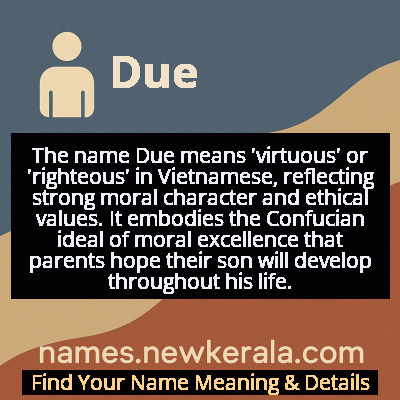Due Name Meaning & Details
Origin, Popularity, Numerology Analysis & Name Meaning of Due
Discover the origin, meaning, and cultural significance of the name DUE. Delve into its historical roots and explore the lasting impact it has had on communities and traditions.
Name
Due
Gender
Male
Origin
Vietnamese
Lucky Number
3
Meaning of the Name - Due
The name Due means 'virtuous' or 'righteous' in Vietnamese, reflecting strong moral character and ethical values. It embodies the Confucian ideal of moral excellence that parents hope their son will develop throughout his life.
Due - Complete Numerology Analysis
Your Numerology Number
Based on Pythagorean Numerology System
Ruling Planet
Jupiter
Positive Nature
Optimistic, inspirational, and creative.
Negative Traits
Scattered, exaggerating.
Lucky Colours
Yellow, gold, purple.
Lucky Days
Thursday.
Lucky Stones
Yellow sapphire.
Harmony Numbers
1, 2, 9.
Best Suited Professions
Arts, writing, communication.
What People Like About You
Creativity, optimism.
Famous People Named Due
Trần Đức
Military General
Revolutionary military leader during Vietnam's independence movement
Nguyễn Văn Đức
Educator
Renowned Vietnamese educator and academic reformer
Lê Đức
Politician
Influential political figure in modern Vietnamese governance
Phạm Đức
Artist
Celebrated Vietnamese painter known for cultural preservation works
Name Variations & International Equivalents
Click on blue names to explore their detailed meanings. Gray names with will be available soon.
Cultural & Historical Significance
Historically, names containing 'Đức' have been common among scholars, officials, and respected community leaders, reflecting the Confucian ideal that moral virtue is the foundation of good leadership. In Vietnamese naming traditions, Đức often appears as either a given name or part of compound names, symbolizing the family's commitment to raising children with strong ethical values. The name carries the weight of cultural expectations about personal conduct, social responsibility, and the Confucian concept of the 'gentleman' who embodies wisdom, benevolence, and righteousness.
The name's cultural significance extends beyond individual identity to represent collective values that have sustained Vietnamese society through various historical challenges. It serves as a cultural anchor, reminding bearers of their connection to traditional virtues while navigating modern life, thus maintaining continuity between past and present generations.
Extended Personality Analysis
Individuals named Due are typically perceived as possessing strong moral character, integrity, and a deep sense of responsibility. They often exhibit qualities of reliability, trustworthiness, and conscientiousness, making them natural leaders and respected figures in their communities. Their virtuous nature manifests in thoughtful decision-making, ethical behavior, and a commitment to doing what is right rather than what is convenient. These individuals tend to be principled and consistent, with a strong internal moral compass that guides their actions and relationships.
In social contexts, people named Due are often seen as mediators and peacemakers, using their diplomatic skills to resolve conflicts and maintain harmony. They typically demonstrate patience, wisdom, and emotional stability, earning them the trust and respect of others. While they may appear reserved or serious at first, they possess deep compassion and genuine concern for others' wellbeing. Their strength of character is balanced by humility, and they often lead by example rather than seeking recognition or praise for their virtuous actions.
These personality traits are reinforced by the cultural expectations associated with the name, creating a self-fulfilling prophecy where bearers often internalize the virtuous qualities their name represents. The combination of innate disposition and social reinforcement typically results in individuals who are not only morally upright but also effective in positions requiring judgment, fairness, and ethical leadership across various aspects of life.
Modern Usage & Popularity
In contemporary Vietnam, the name Due (Đức) remains a popular and respected choice for boys, though its usage has evolved with modern naming trends. While traditional in essence, it continues to be favored by parents who value the cultural heritage and moral connotations the name carries. The name maintains steady popularity across different regions of Vietnam and among overseas Vietnamese communities, particularly among families who wish to preserve cultural traditions and emphasize moral education. In recent decades, there has been a slight decline in its frequency as parents explore more diverse naming options, but it remains a classic choice that conveys dignity, tradition, and strong family values. The name is often combined with modern middle names, creating a balance between cultural preservation and contemporary identity, and continues to be seen as a name that prepares a child for leadership roles and responsible citizenship in both Vietnamese and global contexts.
Symbolic & Spiritual Meanings
Symbolically, the name Due represents the embodiment of moral excellence and ethical integrity in Vietnamese culture. It carries connotations of inner strength, wisdom, and the Confucian ideal of the virtuous person who contributes to social harmony through righteous conduct. The name symbolizes the bridge between personal morality and social responsibility, reflecting the belief that individual virtue forms the foundation of a stable and prosperous society. Metaphorically, it represents the 'moral compass' that guides decision-making and the 'pillar of virtue' that supports family and community. In broader cultural symbolism, Due embodies the enduring values of Vietnamese tradition while adapting to modern contexts, serving as a reminder that moral character remains relevant across generations and societal changes, and that true strength lies not in power or wealth but in unwavering ethical principles and compassionate leadership.

